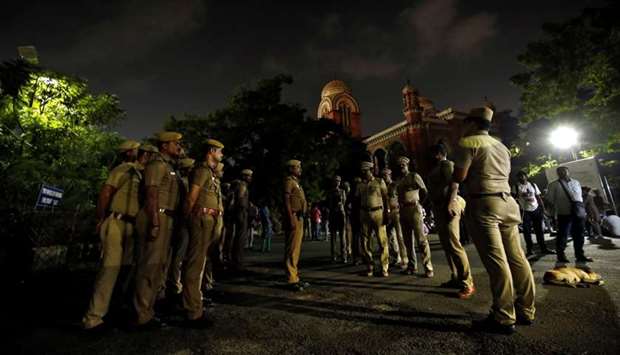India's Supreme Court turned down a plea on Wednesday to stop the implementation of a new citizenship law based on religion that has set off violent protests in the country, but said it would hold hearings next month on the sweeping measure.
The Citizenship Amendment Act (CAA) makes it easier for non-Muslims from the neighbouring countries of Afghanistan, Bangladesh and Pakistan who settled in India prior to 2015 to gain Indian citizenship.Thousands of people have protested, saying the law is anti-Muslim and the latest in a series of measures by Prime Minister Narendra Modi's Hindu nationalist government to marginalise the community.
"We want a stay order in the CAA case," said Kapil Sibal, a lawyer for petitioners who challenged the law in court, adding it was in conflict with parts of the Indian constitution guaranteeing equality to all.
Supreme Court Chief Justice S.A. Bobde refused requests to hold off the implementation of the law, which came into effect last week. The court will however hear petitions challenging the constitutional validity of the law on Jan. 22.
Modi's government says the law was intended to address the persecution of minorities such as Hindus, Sikhs and Christians in the Muslim-majority countries of Pakistan, Afghanistan and Bangladesh.
Those groups, many of whom have been languishing in India for years without rights, will now get an automatic path to Indian nationality if they came from these three countries before 2015.
But protesters say the exclusion of Muslims shows a deep-seated bias against the community, which makes up 14 percent of India's population, the third largest Muslim population in the world.
The new measure follows the revocation of the special status of the Muslim-majority Kashmir region, and a court ruling clearing the way for the construction of a Hindu temple on the site of a mosque razed by Hindu zealots.
On Wednesday, police fired shots in the air in a Muslim-dominated part of Delhi to push back thousands of demonstrators throwing stones and glass bottles demanding the law be withdrawn.
More protests are planned for Wednesday in Delhi.
Gatherings banned
Authorities have imposed an emergency law banning large gatherings in parts of India's capital New Delhi after 12 policemen were injured in protests against a contentious new citizenship law.
Clashes across India following the passage of legislation that fast-tracks citizenship for non-Muslims from three neighbouring countries have claimed six lives.Authorities have imposed an emergency law banning large gatherings in parts of India's capital New Delhi after 12 policemen were injured in protests against a contentious new citizenship law.
A day after intense protests rocked Delhi, police banned gatherings of more than four people in some Muslim-dominated areas in the megacity's northeast.
"In view of the protests on Tuesday prohibitory orders have been issued," a police official told AFP.
Police fired tear gas after thousands of protesters threw stones and set fire to at least two buses and a police outpost in Delhi's Seelampur district.
At least 21 people, including 12 policemen, were injured in the clashes.
Six people were arrested for rioting and arson, police police said Wednesday.
Another six people were arrested in eastern West Bengal state for hurling a bomb at policemen in Howrah city on Tuesday that injured seven officers.
Howrah police commissioner Gaurav Sharma told AFP his officers were attacked when they went to arrest protesters who vandalised a railway station.
More protests were planned later Wednesday across several states including Tamil Nadu, Kerala, Andhra Pradesh and Gujarat.
Authorities have imposed internet blackouts and used force to shut down rallies and sit-ins, but protesters have vowed to keep up their fight until the law is revoked.

